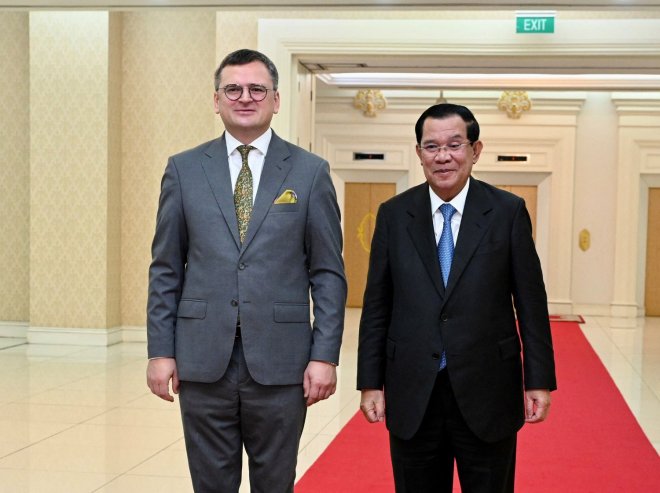
Cambodia’s longtime Prime Minister Hun Sen may be a shrewd and ruthless politician but his chairmanship of the Association of Southeast Asian Nations this year has not enhanced his reputation as a negotiator.
Even before the ASEAN summit that opens on Friday, marking the closure of Cambodia’s tenure as the annual chair of the 10-nation bloc, Hun Sen is staring at another setback in his efforts to mediate in an international conflict.
First it was over the civil conflict in Myanmar, and now Cambodia’s offer to broker a meeting between Russia and Ukraine on the sidelines of the summit in Phnom Penh appears to have drawn a blank, with neither leader from the warring countries set to attend, according to media reports.
In January, Hun Sen drew criticism from human rights groups for making a personal visit to Myanmar, where he met with junta chief Min Aung Hlaing who seized power in a February 2021 coup. He then sent Cambodian Foreign Minister Prak Sokhon to Myanmar twice as ASEAN’s special envoy – failing both times to make Myanmar’s military commit to honoring a five-point consensus on the future of the country that it agreed to at an ASEAN leaders meeting in Jakarta in April 2021.
Instead, there has been an escalation rather than an end to violence in Myanmar. The junta has not held talks with the country’s former civilian leaders and ousted State Counsellor Aung San Suu Kyi has been sentenced to 26 years in prison on what most independent observers say are politically motivated charges. Humanitarian groups complain that they have been unable to get aid to the more than 1 million displaced people that the UN says have been forced from their homes by junta attacks and the burning of their villages.
“Cambodia’s critics assert that Hun Sen gave legitimacy to the military junta by visiting that country,” said Carl Thayer, emeritus professor at the University of New South Wales at the Australian Defence Force Academy. He added that Hun Sen also overreached by sending Prak Sokhon twice “with nothing to show for his diplomatic intervention.”
“Finally, critics rounded on Hun Sen for issuing a statement on recent mass killings in Myanmar without naming the guilty party,” he said referring to the junta’s bombing of a concert in Kachin State, killing more than 60 people.
“Critics argue now is the time to make contact with the National Unity Government, the main opposition group to the military,” Thayer said.
Hun Sen will not get the opportunity to push the junta leader in person since Min Aung Hlaing was not invited to the summit and requests by ASEAN for a non-military representative to come in his place were ignored.
Sarah Cliffe, executive director of the Center on International Cooperation at New York University, said the final leaders’ communique at the ASEAN summit may echo the comments of ASEAN foreign ministers who in October expressed impatience with the lack of progress on the five-point consensus.
“ASEAN has an opportunity to lead on Myanmar – with the kind of regional leadership it took in persuading the then military junta to grant humanitarian access after Cyclone Narghis in 2008 – but the time is running short to show that the ‘ASEAN way’ can deliver results," she said.
Cambodia will pass the baton of the ASEAN chairmanship to Indonesia, amid speculation that Jakarta may take a tougher line with the junta, by setting a timetable for achieving the five-point consensus and pushing for direct talks with the shadow National Unity Government, Nikkei Asia has reported.
Meanwhile, Hun Sen has turned Cambodia’s diplomatic focus as summit host to the Russian invasion of Ukraine. The Cambodian Foreign Ministry said the prime minister was willing to broker talks between the warring parties.
But Russian President Vladimir Putin decided not to attend the ASEAN summit and some leaders objected to plans for a video address by Ukrainian Prime Minister Volodymyr Zelenskyy, which was cancelled this week, according to Cambodia"s Khmer Times. Putin is being represented in Phnom Penh by Russian Foreign Minister Sergei Lavrov, Ukraine by his counterpart Dmytro Kuleba.
While there appeared little prospect of diplomatic progress between Russia and Ukraine, as ASEAN foreign ministers met ahead of the summit on Thursday, Ukraine was accepted as a signatory to ASEAN’s Treaty of Amity and Cooperation – a peace treaty established in 1976 that covers principles such as mutual respect for the sovereignty, territorial integrity and national identity of signatories. That might be viewed as a diplomatic consolation of sorts for Ukraine as it resists the Russian invasion.
The conflicts in Myanmar and Ukraine are still likely to be among the main talking points in the ASEAN leaders" summit that takes place on Friday – ahead of additional summit meetings with leaders from the United States, China and other regional powers such as Australia, India, Japan, New Zealand and South Korea.
Officials and analysts say other items on the agenda will be post-COVID economic recovery in the face of soaring inflation and supply chain disruptions; inter-ASEAN, regional and global trade; climate change; and regional security and territorial disputes, including in the South China Sea.
The series of meetings wraps up on Sunday with the official handover of the ASEAN chair from Cambodia to Indonesia, followed by a closing news conference from the Cambodian leader.
